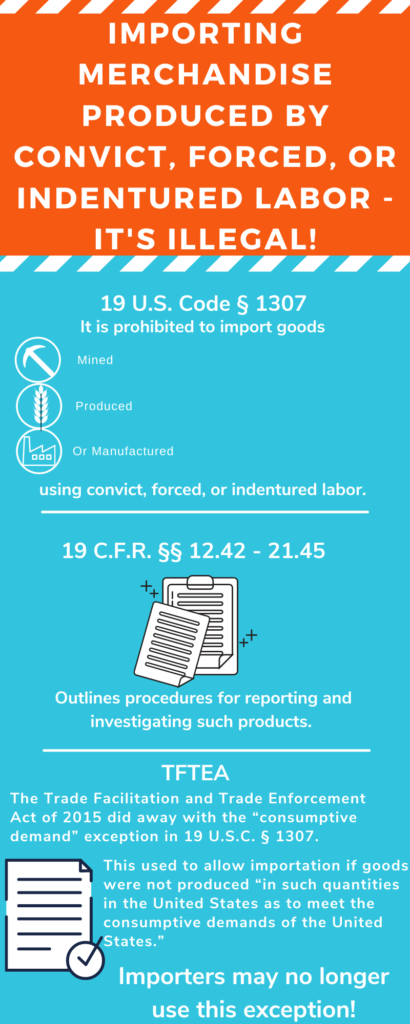Importing Merchandise Produced By Convict, Forced, Or Indentured Labor: It’s Illegal!
By Charlotte Spencer
Most know that importing merchandise produced by forced labor is wrong, but did you know that it’s also illegal?
What Does The Law Say?
As a result of the Tariff Act of 1930, encoded at 19 U.S.C. 1307, it is illegal to import goods mined, produced, or manufactured using convict, forced, or indentured labor. This law was recently strengthened when the Trade Facilitation and Trade Enforcement Act of 2015 closed a loophole known as the “consumptive demand” exception.
This means that importers may no longer get around this restriction even when goods are not produced “in such quantities in the United States as to meet the consumptive demands of the United States.” In other words, they are still going to have to find a different source for these goods produced without convict, forced, or indentured labor even if it is in higher demand than what the current U.S. production can satisfy. They can still import such goods, just not from a supply chain that uses convict, forced, or indentured labor.

Who Polices Such Imports And What Are They Looking For?
U.S. Customs and Border Protection (CBP) is the main organization in charge of policing such imports. Punishment for breaking this law includes confiscation of goods and large fines, not to mention the ensuing public relations nightmare and boycotts that often occur after a company is caught breaking this law. CBP busts and bans of such imports over that past year include seafood from Taiwan; stevia, garments, human hair, cotton, computer parts, and tomatoes from China; tobacco from Malawi; rubber gloves and palm oil from Malaysia; gold from the Democratic Republic of Congo; diamonds from Zimbabwe; and bone black (a type of charcoal) from Brazil. This list is constantly being updated as CBP finds more offending products.
Of particular concern recently has been products coming from the Xinjiang region of China where the Uyghur (alternately spelled Uighur) population has been systematically rounded up and placed into forced labor camps. Several countries have expressed concern that China appears to be conducting a genocide against the Uyghur population. CBP and ICE, with the U.S. Department of State, and the U.S. Department of the Treasury’s Office of Foreign Assets Control (OFAC), issued the following Xinjiang Supply Chain Business Advisory on July 1, 2020:
“The U.S. Department of State, the U.S. Department of the Treasury, the U.S. Department of Commerce, and the U.S. Department of Homeland Security (DHS) are issuing this advisory to highlight the harsh repression in Xinjiang. Businesses, individuals, and other persons, including but not limited to academic institutions, research service providers, and investors (hereafter “businesses and individuals”), that choose to operate in Xinjiang or engage with entities that use labor from Xinjiang elsewhere in China should be aware of reputational, economic, and, in certain instances, legal, risks associated with certain types of involvement with entities that engage in human rights abuses, which could include Withhold Release Orders (WROs), civil or criminal investigations, and export controls.”
CPB issued a region-wide Withhold Release Order (WRO) on “products made by slave labor in Xinjiang” on January 13, 2021. For more on this order see Xinjiang Uyghur Autonomous Region WRO Frequently Asked Questions.
What Can Importers Do To Protect Themselves?
CBP polices this, so the most important thing you can do to protect yourself is to get on the same page as CBP. You can learn about CBP interpretation and enforcement of the law here. You can also view current advisories, news, regions of concern, products of concern, frequently asked questions, and other resources. When in doubt, reach out to them directly about what you are considering importing before you make any legal or financial commitments. They expect importers to have done their due diligence. Their Responsible Business Practices Fact Sheet, which can be extremely helpful, highlights the importance of having a comprehensive supply chain profile, written code of conduct, and robust internal control processes. Their Supply Chain Due Diligence Fact Sheet can also be very helpful.
It’s also important to make sure that you aren’t running afoul of any other laws in the process of importing products. This article covers only the ban on forced labor produced goods. CBP also polices, amongst other things, imports that violate trade bans and sanctions not related to forced labor, and imports of various different dangerous and illegal substances.
What Should You Do If You Suspect A Violation Of This Law?
You may have reason to believe that a competitor is cheating the system, or that a supplier is being dishonest with you about the source of goods and whether they were produced using forced labor. CBP regulations state that “any person who has reason to believe that merchandise produced by forced labor is being, or is likely to be, imported into the United States may communicate his belief to any Port Director or the Commissioner of CBP (19 C.F.R. § 12.42).” You can report this by going to their e-Allegations page or by calling 1-800-BE-ALERT.
The writer is a lawyer and a coder, and a member of the Arizona bar.
If you have feedback on this article, please write to us at marketing@biometrica.com.